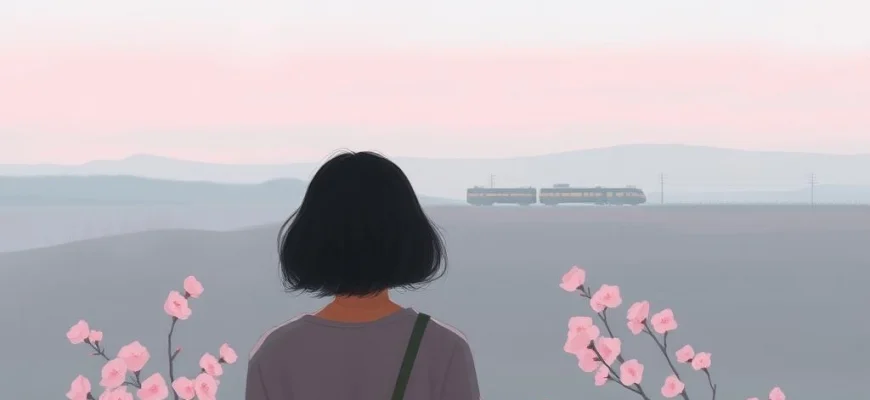If you loved the emotional depth and breathtaking visuals of '5 Centimeters per Second' (2007), you're in for a treat. This article explores 10 similar movies and shows that capture the same melancholic beauty, introspective storytelling, and poignant themes of love and distance. Whether you're a fan of Makoto Shinkai's work or simply crave more heartfelt narratives, these recommendations will resonate with you.

Only Yesterday (1991)
Description: This film explores themes of nostalgia, personal growth, and the contrast between past and present, much like the reflective and emotionally rich narrative of the reference title.
Fact: It was one of the first Studio Ghibli films to target an adult audience. The film's rural setting was meticulously researched to ensure authenticity.
 Watch Now
Watch Now 
Ocean Waves (1993)
Description: A tender and understated film about young love and missed connections, this movie captures the same quiet emotional depth and realism as the reference title.
Fact: It was originally made as a TV movie and is one of the studio's lesser-known works. The story is based on a novel by a Japanese author.
 Watch Now
Watch Now 
Whisper of the Heart (1995)
Description: A coming-of-age story that focuses on self-discovery, artistic passion, and the uncertainties of youth, resonating with the introspective and heartfelt storytelling of the reference title.
Fact: The film features the song 'Country Roads,' which plays a significant role in the plot. It was the directorial debut of the studio's longtime animation director.
 Watch Now
Watch Now 
The Place Promised in Our Early Days (2004)
Description: This film delves into themes of longing, unfulfilled promises, and the passage of time, mirroring the emotional weight and introspective storytelling style of the reference title.
Fact: It was the director's debut feature film. The story was inspired by the director's own experiences and dreams during his youth.
 Watch Now
Watch Now 
Summer Wars (2009)
Description: While more action-packed, this film shares a focus on personal connections, the impact of technology on relationships, and a visually striking animation style that echoes the reference title's aesthetic.
Fact: The film's virtual world was inspired by the director's interest in online communities and digital interaction. It won several awards for its animation and storytelling.
 Watch Now
Watch Now 
From Up on Poppy Hill (2011)
Description: Set in a nostalgic past, this film explores themes of young love, memory, and the bittersweet nature of growing up, much like the emotional tone of the reference title.
Fact: The film is based on a manga series from the 1980s. It was directed by the son of Studio Ghibli's co-founder, marking his directorial debut.
 Watch Now
Watch Now 
Children Who Chase Lost Voices (2011)
Description: A beautifully animated adventure that blends fantasy with deep emotional undertones, focusing on loss, love, and the journey to find meaning, similar to the reference title's narrative approach.
Fact: The film was heavily influenced by classic adventure stories and mythology. It features a unique blend of Studio Ghibli-esque aesthetics with a more action-oriented plot.
 Watch Now
Watch Now 
The Wind Rises (2013)
Description: A historical drama that balances personal dreams with harsh realities, this film shares the reference title's contemplative mood and beautifully detailed animation.
Fact: This was the director's final film before retirement. It is a fictionalized biography of Jiro Horikoshi, the designer of the Mitsubishi A6M Zero fighter plane.
 Watch Now
Watch Now 
The Anthem of the Heart (2015)
Description: A poignant story about emotional barriers and the power of communication, this film captures the same delicate handling of human emotions and relationships as the reference title.
Fact: The film's protagonist is unable to speak due to a childhood trauma, a unique narrative device. It was produced by the same studio behind many beloved anime films.
 Watch Now
Watch Now 
Weathering with You (2019)
Description: A visually stunning anime that explores themes of love, separation, and the impact of nature on human lives, much like the reference title. The emotional depth and melancholic tone resonate strongly.
Fact: The film was the first Japanese movie to be screened in IMAX theaters in Japan. It also features a cameo appearance of characters from the director's previous work.
 Watch Now
Watch Now 








